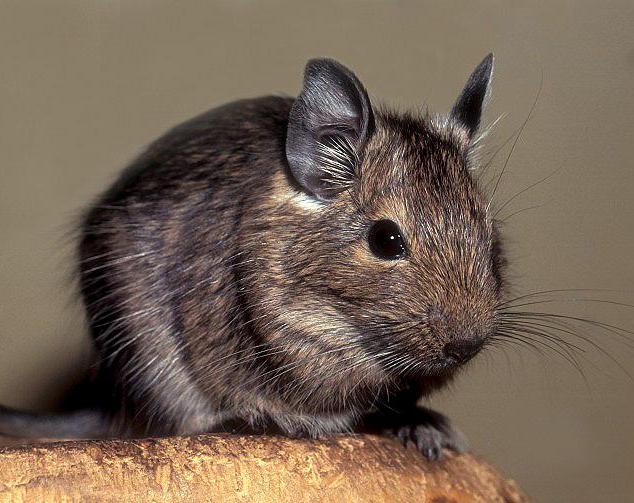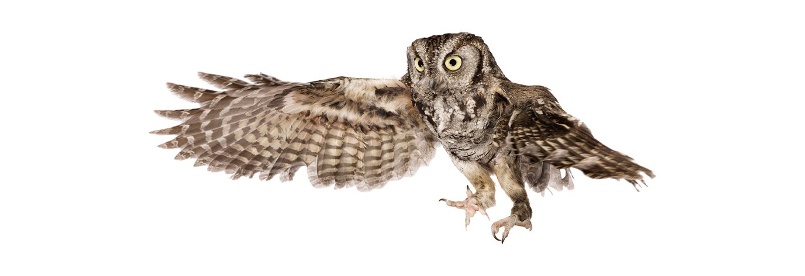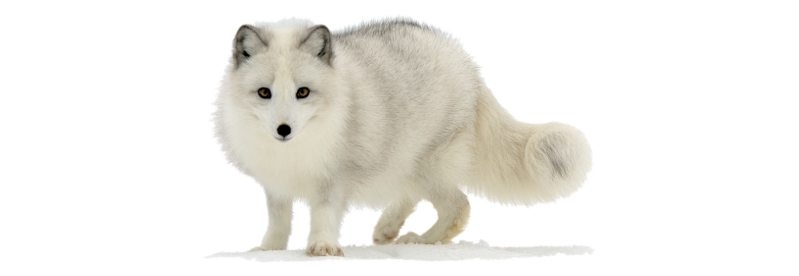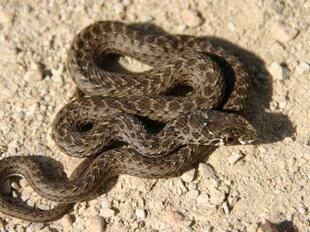
Degu, or brush-tailed rat, or common degu(Octodon degus)
Phylum —chordata
Class — mammalia
Order — rodentia
Family — octodontidae
Genus – octodon
Appearance
The degu is a small animal with a body length of 25.0 to 31.0 cm (9.8–12.2 in) and a weight of 170 to 400 g (6.0 to 14.1 oz). It has yellow-brown fur above and creamy-yellow below, with yellow around the eyes and a paler band around the neck. It has a long, thin tail with a tufted, black tip, dark sparsely furred ears, and pale grey toes. Its fifth toe is small with a nail, rather than a claw, on the fore feet. Its hind feet are bristled.
Habitat
Degus mainly occur in the west central Chile, where they live in "matorral" habitat - a mediterranean-type semi-arid shrubland, located on the lower western slopes of the Andes.
Behavior
Degus are social animals, forming small groups of 1 - 2 males and 2 - 5 females, which are typically related. Females of a group practice allomothering, rearing offspring of one another. Each group has its own territory, where it lives during most of the year. These diurnal animals are active in the morning and evening. Degus are semi-fossorial, digging huge burrow systems, where they live together with Bennett's chinchilla rats. Feeding occurs above the surface, although they tend to descend to the low branches of shrubs to find food. Degus enjoy wallowing in dust. Each group has its favorite wallowing sites, which they mark with their gland secretions. Due to these secretions, group members are able to identify each other and establish their territory.
Diet
As herbivorous animals, degus mainly consume leaves, bark, forbs as well as seeds of various shrubs.
Reproduction
Degus have a polygynous mating system. During the breeding season, males aggressively defend their mating rights. They usually drive out other males from their burrow, limiting their access to 2 - 4 females, living there. Populations in the wild are known to breed once a year, typically during the autumn, in late May. Young are born between late winter and early spring (in September-October). Gestation period lasts for 90 days, yielding a litter of 4 - 6 babies. The number of litters per year depends on weather conditions: usually, wet years bring 2 litter, while dry years yield only a single litter. Newborn degus are precocial, possessing fur and teeth. They are born with open eyes and can move around the nest independently. Weaning occurs within 4 - 5 weeks, while sexual maturity is reached at 12 - 16 weeks old. They attain adult size at 6 months old. As a general rule, young degus remain in single-sex groups until around 9 months of age, and only after that they begin breeding.
The lifespan of a degu is around five to nine years, although in the wild it's only one to two years.
In captivity
Degus need a large cage. A minimum cage size of 24 inches by 18 inches by 24 inches should house two degus comfortably. The larger, the better. Multilevel cages built for ferrets or chinchillas are ideal. The surfaces should be solid and not wire slats.
Degus are avid chewers. Make sure the enclosure is made of wire or metal; they can eat their way through wood and plastic. A degu enclosure should have a nesting box to replicate the burrows they dig in the wild. A 6- by 8-inch wooden box with a flat roof to sit on should work. Provide nesting material in the form of tissues, paper towels, hay, or shredded paper. Paper-based bedding is safer and just as absorbent when changed out regularly.Degus need a solid-surface exercise wheel (11 inches in diameter). Thick branches also make great playscapes for climbing along with cotton ropes.
Since degus are determined chewers, chewing opportunities thwart boredom and keep teeth healthy. A variety of woodblocks and chew toys designed explicitly for rodents should be offered and changed out often. Willow balls and toys made for rabbits or parrots also work. A mineral or salt block designed for rodents is another nice distraction while providing your pet with extra nutrients.
Degus need regular dust baths to keep their skin and coat in good condition. Provide your pet with a shallow bowl containing an inch or two animal bath dust or bath sand. Leave this in the cage for a half an hour to give it ample time to roll around. Repeat dust baths biweekly.Degus eat a diet high in roughage and low in carbohydrates. Thus, the basis of a proper degu diet is a combination of high-quality chinchilla or guinea pig pellets and a rodent block. Make a nutrient-rich grass, like Timothy hay or alfalfa, available at all times. Provide fresh vegetables daily, such as sweet potato (peeled, uncooked), carrots, leafy greens (spinach, dandelion leaves, parsley), and green beans every day.
Avoid giving your degu cruciferous vegetables like cabbage, broccoli, Brussels sprouts, and kale. Their systems can't handle these veggies in excess. Do not feed fruit; its sugar content is too high.
For occasional treats, you can offer sunflower seeds, peanuts, and whole nuts in the shell (sparingly, due to high-fat content).
Your degu needs clean, fresh water available at all times. Use a heavy ceramic dish for a water bowl or a water bottle with a metal tube that has a chew guard.
 Russian
Russian
 English
English
























